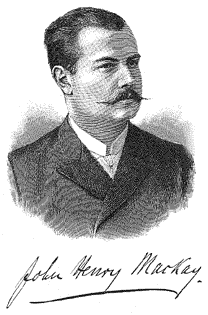John Henry Mackay
John Henry Mackay (6 February 1864 Greenock, Scotland – 16 May 1933 Stahnsdorf, (Germany)) was an egoist anarchist, thinker and writer. Born in Scotland and raised in Germany, Mackay was the author of Die Anarchisten (The Anarchists, 1891) and Der Freiheitsucher (The Searcher for Freedom, 1921). Mackay was published in the United States in his friend Benjamin Tucker's magazine, Liberty.
John Henry Mackay | |
|---|---|
 | |
| Born | 6 February 1864 Greenock, Scotland |
| Died | 16 May 1933 (aged 69) Stahnsdorf, Germany |
| Pen name | Sagitta |
| Occupation | Writer, philosopher |
| Nationality | dual British/German |
| Genre | non-fiction |
| Subject | Political philosophy |
| Literary movement | Naturalism |
| Notable works | Die Anarchisten (The Anarchists) Der Freiheitsucher (The Freedomseeker) |
Life
Mackay was born in Greenock on 6 February 1864. His mother came from a prosperous Hamburg family. His father was a Scottish marine insurance broker who died when the child was less than two years old, at which point mother and son returned to Germany, where Mackay grew up.[1]
Mackay lived in Berlin from 1896 onwards, and became a friend of scientist and Gemeinschaft der Eigenen co-founder Benedict Friedlaender.
Mackay died in Stahnsdorf on 16 May 1933, ten days after the Nazi book burnings at the Institut für Sexualwissenschaft. Adolf Hitler had become Reichskanzler on 30 January 1933, and soon all activities of the German homosexual emancipation movement ceased. Allegations that Mackay's death may have been a suicide have been disputed:
Mackay died on 16 May 1933 in the office of his doctor, only a few houses from his own, apparently of a heart attack. He was also suffering from stones in his bladder.
— Kennedy, Hubert. Anarchist of Love: The Secret Life of John Henry Mackay
Writing and influence
Political philosophy
During a one-year stay in London (1887/88) he discovered the works of Max Stirner, whose book The Ego and its Own had merely been forgotten in the second half of the 19th century. Stirner soon became his life's topic. He lifted this 19th century philosopher from obscurity by writing the first and to date only biography Max Stirner – sein Leben und sein Werk (1898, 1910, exp. 1914), which, however, was occasionally criticized for lack of source references and its often perceived as hagiographic tone. Because Mackay became Stirner's most famous follower, it fed the impression that his conception of individualistic anarchism, which he presented in his "Books of Freedom" (The Anarchists, The Searcher for Freedom), was based on Stirner's ideas. There is however also a correspondence with ideas of writers like Thomas Jefferson, Ralph Waldo Emerson, Henry David Thoreau and others, like the radical liberalism of his friend Benjamin Tucker.
Sexual orientation and society
Using the pseudonym Sagitta, Mackay wrote a series of works for pederastic emancipation, titled Die Bücher der namenlosen Liebe (Books of the Nameless Love). This series was conceived in 1905 and completed in 1913.[2] Under his real name he also published fiction, such as Der Schwimmer (1901) and, again as Sagitta, he published a pederastic novel of the Berlin boy-bars, Der Puppenjunge (literally "The Boy-Doll", but published in English as The Hustler) (1926). In a note to the American publisher of this book, Christopher Isherwood said, "It gives a picture of the Berlin sexual underworld early in this century which I know, from my own experience, to be authentic."
Richard Strauss's well-known songs from his Vier Lieder (Op. 27), a wedding gift to his wife in 1894, include settings to music of two of Mackay's poems: "Morgen!" and "Heimliche Aufforderung". Other uses of Mackay's poems by Strauss include "Verführung" (Op. 33 No. 1) and "In der Campagna" (Op. 41 No. 2).
Arnold Schoenberg set music to his poem "Am Wegrand".
See also
References
-
- Kennedy, Hubert (2002). "Mackay, John Henry (1864–1933)". glbtq: an encyclopedia of gay, lesbian, bisexual and transgender, & queer culture. glbtq.com. Archived from the original on 29 June 2011. Retrieved 25 August 2011.
- "Richard Strauss and John Henry Mackay" by Hubert Kennedy. Thamyris 2.
Further reading
- Kennedy, Hubert. Anarchist of Love: The Secret Life of John Henry Mackay (2nd Edition, 2002)
- "On the Nameless Love and Infinite Sexualities: John Henry Mackay, Magnus Hirschfeld and the Origins of the Sexual Emancipation Movement", Journal of Homosexuality, Vol 50, No.1, 2005.
External links
- John Henry Mackay (1864–1933) Find A Grave memorial
- Works by John Henry Mackay at Project Gutenberg
- Works by or about John Henry Mackay at Internet Archive
- Works by John Henry Mackay at LibriVox (public domain audiobooks)

- Bike tour to John Henry Mackay’s grave
- Thomas A. Riley, New England Anarchism in Germany. Retrieved 2 February 2008.